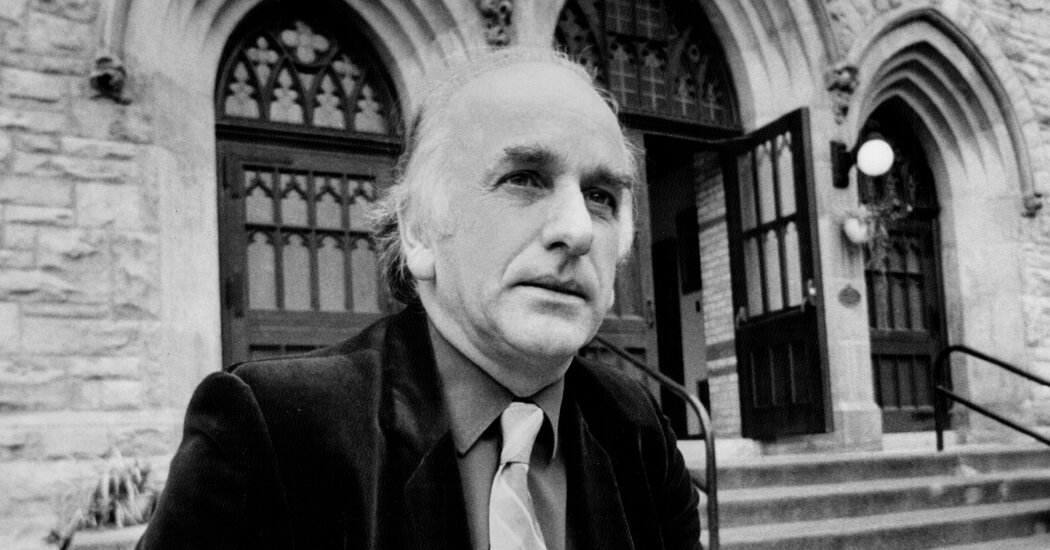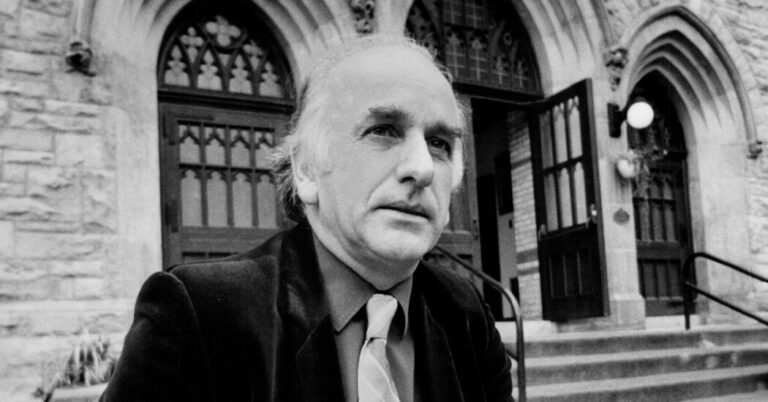Derek Humphry, a journalist of British origin whose experience by helping his terminal wife to end his life led him to become a crusader pioneer in the movement of the right to a diet and publish “final exit”, a more sold guide to suicide, He died on January 2 in Eugene, hours. He was 94 years old.
His death, in a hospice structure, was announced by his family.
With a populist touch and a talent to speak very still on death, Mr. Humphry almost galvanized a national conversation on the suicide assisted by a doctor in the early 80s, a period in which the idea had been little more than an esoteric Theory beaten by medical ethics.
“It was he who really put this cause on the map in America,” said Ian Dowbiggin, professor at the University of the island of Prince Edoardo and author of “A Concise History of Euthanasia: Life, Death, God and Medicines” ( 2005). “People who support the notion of suicide assisted by doctor must absolutely a great thanks.”
In 1975, Mr. Humphry was working as a journalist for the Sunday Times in London when Jean Humphry, his 22 -year -old wife, was in the final stages of terminal bone cancer. Hoping to avoid prolonged suffering, he asked him to help her die.
Mr. Humphry procured a lethal dose of painkillers from a understanding doctor and mixed them with coffee in his favorite cup.
“I took the cup and told her that if she had drunk it would die immediately,” Humphry at the Daily Record in Scotland said. “Then I hugged them, I kissed her and greeted.”
Mr. Humphry told the emotional research, taboo and legally fractional of his wife’s hasty death in “Jean’s Way” (1979). The book, extracted in newspapers around the world, was a feeling. Readers sent letters to the publisher discussing the suffering of their loved ones. Many have written directly to Mr. Humphry.
“I wish we had a solution like yours,” a woman wrote, describing the last eight weeks of her husband’s life as “a horror”. “How much more beautiful, the more” love “. We did what others have forced us to do and experience that terrible” death “that the medical world gives prolonging life in every possible way”.
In their letters, some readers asked for instructions to help their loved ones to die. This has pushed Mr. Humphry, since then he has remarried and working in California for Los Angeles Times, to think about the creation of an organization to support assisted suicide and end of life rights for terminal patients.
Ann WICKETT HUMPHRY, his second wife, suggested using Hemlock as a title, “claiming that most Americans associates the word to the death of Socrates, a man who discussed and planned his death,” he wrote the later Mr. Humphry in an updated edition of “Jean’s Way.”
In August 1980, they rented the Los Angeles Press Club to announce the institution of the Hemlock Society, which ran out of the garage of their home in Santa Monica.
The organization has grown rapidly. In 1981, he emitted “Let me die before waking me up”, a guide to medicines and dosages to induce “peaceful peaceful”. The group has also put pressure on state legislatures to issue laws making assisted suicide legal. In 1990, the Hemlock Society moved to Eugene. At that point, he had more than 30,000 members, but the conversation from right to diet had not yet reached most of the dining tables in America.
This changed spectacularly in 1991, after Mr. Humphry published “final exit: the practicality of the car-consegna and assisted suicide for death”. The book was a 192-page step-pass guide which, in addition to explaining the suicide methods, provided manne-like suggestions to exit grace.
“If unfortunately you are obliged to end your life in a hospital or a motel,” he wrote, “it is kind to leave a well -known excuse for the shock and the inconvenience to the staff. I also heard about an individual who has left A generous suggestion to a Motel staff.
The book quickly went to n. 1 In the category of tips on the rigid cover of the New York Times best seller list.
“This is an indication of how big the issue of euthanasia looms in our company now,” said the bioethicist Dr. Arthur Caplan in 1991. “It is frightening and disturbing, and that type of sales figure is a blow through the ‘Arco.
The “final exit” reactions were generally divided along the ideological lines. The conservatives made him skip.
“What can you say about this new” book “? In One Word: Evil”, the bioethicist of the University of Chicago Leon R. Kass wrote in the comments magazine, calling Mr. Humphry “The Lord High Executioner”. “I didn’t want to read it, I don’t want you to read it. He would never have to be written and does not deserve to be dignified with a review, not to mention an article. “
But the progressives embraced the book, even if the public health experts expressed concern for the fact that the methods that has established could be used by depressed people who were not afraid of terminals.
“I read” final exit “out of curiosity, but I will keep it for another reason – because I can imagine, having once attached a cancer patient, the day I could want to use it”, the New York Times the editorialist Anna Quinadlen wrote, adding: “And if that day comes, who is really, but mine and that of those I love?”
Rather than worrying about the content of the book, Mrs. Quintine said: “We should look for ways to ensure that dignified death is available in places other than the bookstore of the shopping center chain”.
Derek John Humphry was born on April 29, 1930 in Bath, England. His father, Royston Martin Humphry, was a travel seller. His mother, Bettine (Dugan) Humphry, had been a fashion model before getting married.
After leaving school at the age of 15, Derek got a job as a newspaper. The following year, Bristol’s evening world took it as a journalist. He continued to report for the Manchester Evening News and the Daily Mail before moving to the Sunday Times in London and then to the Los Angeles Times.
Before turning to the books on death, Mr. Humphry wrote “because they are black” (1971), an examination of racial discrimination written with Gus John, a black social worker; And “Police and Neri power” (1972), on racism and corruption in the courtyard of Scotland.
Mr. Humphry was also a polarizing figure within the movement from right to death.
In 1990, he and Mrs. Wickett Humphry divorced and fought bitterly in the media. He called him a “fraud”, accusing him of leaving it because he had been diagnosed with cancer. Mr. Humphry denied the accusation.
“This was a very shaky marriage,” he told the New York Times in 1990. “This is extremely painful, as bad as Jean’s death. I lost my home; I lived in a motel for three months.”
Mrs. WICKETT Humphry killed himself in October 1991.
In a video recorded the day before, he expressed doubts about the work they had done together, including helping his parents to finish life at home.
“I moved away from that house thinking that we are both killers,” he said in the video, that he was revised by the Times.
Mr. Humphry went to “damage control” mode, “he said to the Times. He put a half -page advertising in the newspaper explaining his side of the story.
“Unfortunately, for most of his life, Ann was persecuted by emotional problems,” said advertising, adding that “suicide for reasons of depression has never been part of the Create’s creed”.
The death and reserves of Mrs. WICKETT HUMPHRY on the right to diet movement caused effort within the Hemlock Society. Humphry resigned as an executive director in 1992 and started the research and orientation organization of euthanasia.
The Hemlock Society eventually popped up in several new groups, including the final release network, which Mr. Humphry helped to start.
He married Gretchen Crocker in 1991. She survives, together with three children of her first marriage; three grandchildren; It is a great -grandson.
Lowrey Brown, a “output” output “output network that helps to plan thermal patients, said in an interview that its customers sometimes attribute Mr. Humphry and” final exit “for giving them the courage to place end to their life.
“It was the Hemlock Society and the book” Exit Final Exit “that really crossed the threshold of bringing it to the lounges of ordinary Americans as a topic of discussion,” said Mrs. Brown. “You may talk about the thanksgiving dining table.”
If you have thoughts of suicide, call or send a 988 text to reach the suicide and the Langa crisis or go to SpeakOofsuicical.com/resources For a list of additional resources.





